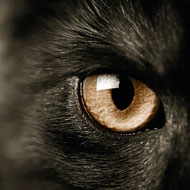Sight matters more to cats than smell

It's all in the eyes: sight is more important to cats than smell when it comes to finding food.
Sight may be more important to cats than smell when it comes to finding the location of food, a study by the University of Lincoln has revealed.
The findings, published by the international journal Applied Animal Behaviour, suggest that when cats have a choice, they prefer visual signals over olfactory ones.
Scientists say that the work might have important clinical implications for cat welfare, as it supports the idea that the individual needs of cats should be met, rather than the population in general.
Evy Mayes, who works at Battersea Dogs & Cats Home and carried out the research as part of her Masters degree in feline behaviour and welfare, said: "Up until now we really thought that the sense of smell would dominate how cats view the world, but we are now reconsidering this and also the implications of how we manage them."
"At Battersea Dogs & Cats Home we make sure that our cats are housed in the best possible environment - one that respects the cat and provides each individual with whatever it needs in order to help it adapt to a rehoming environment."
In the study, a group of six cats were placed in a maze which contained 'decision' points. The cats had to choose which route they took based on their preference for using smell or images. They were presented with two squares of paper - each containing a different visual and odour cue. One combination of stimuli indicated they would receive a food reward, whereas the other led to no reward.
Once the cats had learned the rules of the game and received food rewards for correctly identifying either the visual or olfactory stimulus, the researchers separated the cues, to investigate whether the cats were using their eyes or nose to solve the puzzle.
Four out of the six cats chose the visual cue over the odour cue to receive their food, with only one cat opting to use its nose and the sixth showing no preference.
Professor Daniel Mills who supervised the study said: “We live in a complex world and use all of our senses to make sense of it. This is the first time we have asked cats how they operate rather than assumed this from what we know about their senses.
"Another important finding from this work is the individual variability - different cats had quite fixed preferences, and this may have important implications for their welfare. If there is a cat which has a strong preference for using its nose then simple changes in the smell of the environment might have a big impact on it, whereas, for others it may be insignificant.
"This work provides a unique insight into the important principles of attending to the needs of the individual rather than the population in general for good welfare.”
Due to the small sample size, the researchers say that further investigation is needed to deduce whether cats in general prefer to use their nose more than their eyes when searching for food.
The study, 'Individual differences in visual and olfactory cue preference and use by cats (Felis Catus)' by Evelyn-Rose Mayes et al. is published in Applied Animal Behaviour Science.



 RCVS Knowledge has welcomed Professor Peter Cockcroft as editor-in-chief for Veterinary Evidence.
RCVS Knowledge has welcomed Professor Peter Cockcroft as editor-in-chief for Veterinary Evidence.